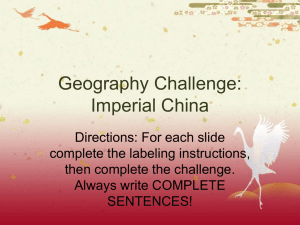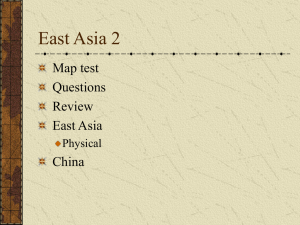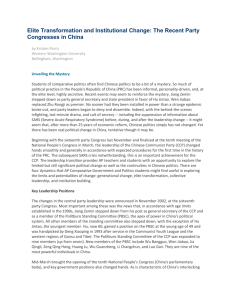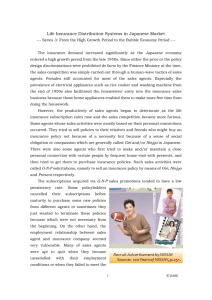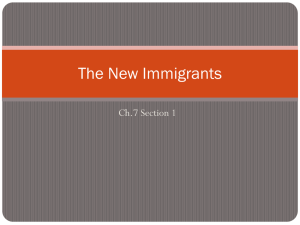Chinese Politics and Changing Japan-China Relations
advertisement
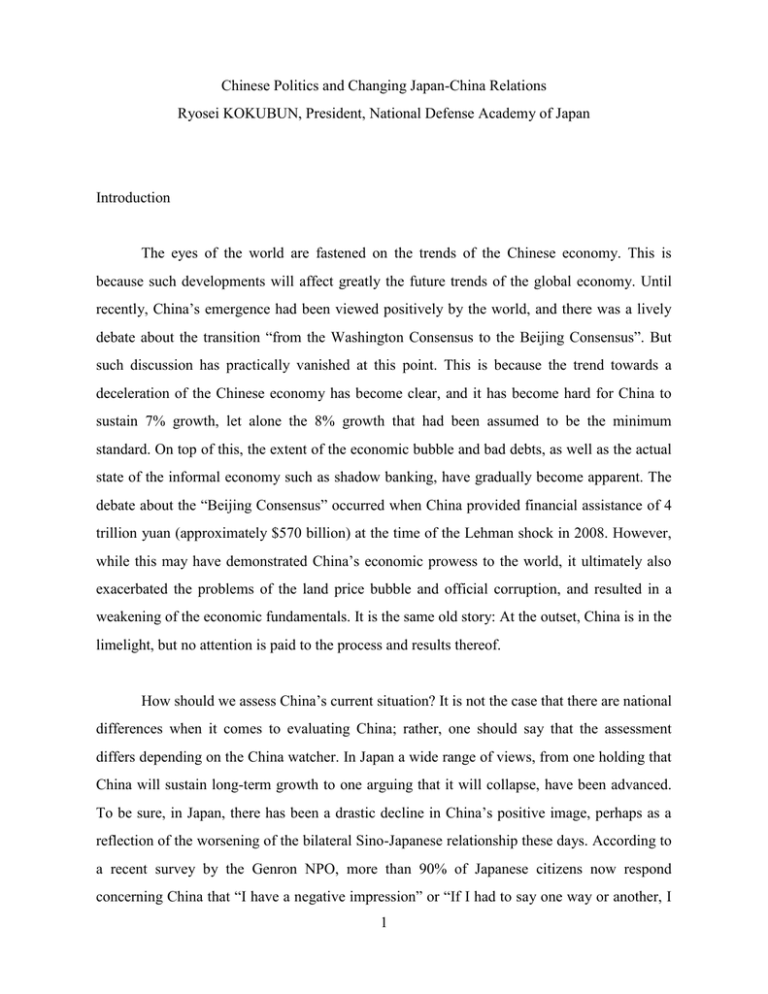
Chinese Politics and Changing Japan-China Relations Ryosei KOKUBUN, President, National Defense Academy of Japan Introduction The eyes of the world are fastened on the trends of the Chinese economy. This is because such developments will affect greatly the future trends of the global economy. Until recently, China’s emergence had been viewed positively by the world, and there was a lively debate about the transition “from the Washington Consensus to the Beijing Consensus”. But such discussion has practically vanished at this point. This is because the trend towards a deceleration of the Chinese economy has become clear, and it has become hard for China to sustain 7% growth, let alone the 8% growth that had been assumed to be the minimum standard. On top of this, the extent of the economic bubble and bad debts, as well as the actual state of the informal economy such as shadow banking, have gradually become apparent. The debate about the “Beijing Consensus” occurred when China provided financial assistance of 4 trillion yuan (approximately $570 billion) at the time of the Lehman shock in 2008. However, while this may have demonstrated China’s economic prowess to the world, it ultimately also exacerbated the problems of the land price bubble and official corruption, and resulted in a weakening of the economic fundamentals. It is the same old story: At the outset, China is in the limelight, but no attention is paid to the process and results thereof. How should we assess China’s current situation? It is not the case that there are national differences when it comes to evaluating China; rather, one should say that the assessment differs depending on the China watcher. In Japan a wide range of views, from one holding that China will sustain long-term growth to one arguing that it will collapse, have been advanced. To be sure, in Japan, there has been a drastic decline in China’s positive image, perhaps as a reflection of the worsening of the bilateral Sino-Japanese relationship these days. According to a recent survey by the Genron NPO, more than 90% of Japanese citizens now respond concerning China that “I have a negative impression” or “If I had to say one way or another, I 1 have a negative impression”. Parenthetically, the results are even worse when Chinese citizens are asked about Japan. That said, it is by no means the case that Sino-Japanese relations are on the verge of exploding. Reason and efforts from all quarters of both countries aimed at avoiding conflicts are effective, and both countries continue to grope towards an improvement of relations, albeit with mixed results. Why have Sino-Japanese ties fallen into such a state? On this score, there have been a large number of analyses and critiques of Japanese policy-making in both China and Japan. In particular, it was common for Sino-Japanese relations to be discussed in relations to the changes of administration and chaotic political situation in Japan since the start of the 21 st century, including such things as the successive Liberal Democratic Party (LDP) administrations from Koizumi to Abe, Fukuda and Aso, and the successive Democratic Party of Japan (DPJ) administrations of Hatoyama, Kan and Noda. I myself have recently depicted the transformation of Japanese diplomacy towards China in the historical fluctuations of politics and economics, from the era in which the LDP, bureaucrats and financial circles formed a triumvirate under the “1955 system”, through the end of the Cold War, the collapse of Japan’s bubble economy and political instability in Japan from the 1990s on. But although it is easy to take an interest in Japanese diplomacy towards China and to make it the subject of discussion given the facts that the process of policy formation is transparent and there are many public statements by the parties concerned, little attention has been paid to the fact that the policy-making process on the Chinese side is utterly nontransparent, and the public statements made by the Chinese parties involved in it are invariably the same. Perhaps as a reflection of such circumstances, this is prone to the tendency to think in terms of what the Japanese side should do first of all about improving Sino-Japanese ties. In current Sino-Japanese relations, the Chinese side assumes that “all of the responsibility lies with Japan”, and Japan is showing no signs of acting proactively on its own, such as sending envoys. In response to this, from the Japanese side, Prime Minister Abe has sent personal letters, and has dispatched numerous envoys in order to open negotiations. This is a matter of impressions, but in Chinese diplomacy, there is tendency for China itself not to act at its own 2 initiative for the improvement of relations, and instead first to ascertain the moves by the counterpart nation. Accordingly, in this lecture, I would like to reconsider closely recent Sino-Japanese relations from the standpoint of the policy-formation process on the Chinese side. This is because analyses based on the Japanese side only are one-sided, and a more balanced overall picture cannot be achieved. In the analysis below, I prove that there are not only the variables on the Japanese side but also some extremely large variables on the Chinese among the major factors in the deterioration of Sino-Japanese ties. However, to that end, we must first understand the issue in terms of the overall state of China’s internal politics and diplomacy. This is because it is not adequate to understand China’s policies towards Japan on their own; they should rather be understood as one party of the overall internal and external overall situations faced by China. Power Struggles Surrounding the 18th Chinese Communist Party Congress The essence of Chinese politics is power struggles. This holds true whether we are talking about the Cultural Revolution, or the Tian’anmen Incident, or the present. At the same time, this is visible in every possible site, not only the center, but also from the regions to the grass roots. However, the actual status thereof cannot be understood at all if we observe these struggles only from the outside. Moreover, when it comes to the power struggles from the latter half of the 1990s on, Chinese politics have become a politics of compromise among leaders since charismatic leaders have disappeared due to the death of Deng Xiaoping in 1997, and in addition they have also become fierce interest politics due to the introduction of a market economy under the aegis of a one party dictatorship. In sum, the substance of the power struggles has become a scramble for posts and massive profits. Here, there is room for political reform as a measure aimed at a system that takes the opinions of citizens into account. 3 Although it can be hypothesized that the current Communist Party leadership includes a “princeling party” faction led by Xi Jinping, a Shanghai faction centered around Jiang Zemin and a Communist Youth League faction guided by Hu Jintao, the human relationships of the individual parts are fluid to a certain degree. That said, the princeling party is a network possessing a firm organizational base, and its functions as a function appear to be weak. Closely allied to it is Zeng Qinghong, who himself is a member of the princeling party. During the Hu Jintao era, it was Zeng himself, who was then Vice President of the PRC, recommended Xi Jinping as supreme leader. The chief power bases of the Shanghai faction are the Politics and Law (Security) Department and Propaganda and Ideology Department, but it is also supported strongly by the elders of the Old Guard. They strongly support the preservation of the current system for the protection of vested interests, and owing to this the support from state-owned enterprises is also strong. The Communist Youth League faction has a solid power base in the CCP organization, but its power base beyond that is weak. It has a strong reformist bent, and its ties with the interests are relatively weak, and given this it does not receive support from the entrenched interests. It is also disliked by the elders of the Old Guard, but on the other hand it is supported by those reform-oriented elders who have an antipathy towards Jiang Zemin. In addition to this schematic classification, we must not forget either the State Council, which is the policy implementation organ with economic officials as its core, and the national defense and security institutions like the People’s Liberation Army and the People’s Armed Police. The army in particular is an enormous organization, the human networks inside it are intricate, and one may infer that the army’s top-ranking officers maintain separate relations with the factions of the upper ranks of the CCP. Looking back over the recent past, we can see that during the Hu Jintao era from 2002 to 2012, Hu did not fully control a strong enough power base for him to advance his own policies. The Jiang Zemin era was a time completed devoted to promoting economic growth, and Hu Jintao promulgated the policy of “construction of the harmonious society” in order to rectify the imbalances and divisions that arose from this. This policy direction itself was 4 correct. However, a decade later, those same imbalances and divisions had only grown larger. This was because it proved nearly impossible to launch specific policies to address these problems, and as a consequence the line of overemphasizing economic growth continued. 5 or 6 of the positions on the 9-member Standing Committee of the CCP’s Politburo during the Hu Jintao era were held throughout by the Jiang Zemin faction, and although Hu was just barely able to appoint his confidante Li Keqiang among the 9 members at the 17th Chinese Communist Party Congress in 2007, Xi Jiping, who was supported by Zeng Qinghong, was selected at the head of the next generation of senior leaders, and Hu was unable to place Li in the top post. In this manner, the various checks imposed by the Jiang Zemin and Zeng Qinghong factions may have been effective for the entire decade when Hu Jintao was top leader. However, such a policy line of overemphasis on economic growth, as evidenced by such things as the massive investment in fixed assets, which brought about bubbles in the land and housing markets, and overinvestment in the main core industries like energy and steel, resulted in major strains in society. Moreover, during the pursuit of this line of investmentdependent growth, the vested interests called the special interest groups ended up being formed. The nucleus thereof is the state-owned enterprises that are present in various key industries, and these have become huge interest groups in which politics and economics are inextricably intertwined due to the fact that CCP cadres and their family members hold sway over them. They are making every effort to transfer assets overseas without declaring them, evade taxes, and send their children and relatives overseas to study or live. The thing that enabled this was the socialist market economy under the leadership of the CCP. The group that reigned at the summit of such vested interests was the Shanghai faction, which lay at the center of power at that time, and it was also the princeling party. This system of imbricated politics and economics confronted no major problems as long as rapid economic growth continued. But after the Lehman shock in 2008, China also suffered from the repercussions of the downturn in the world economy, and the trend towards a deceleration of China’s economic growth gradually became evident. The crises due to the collapse of the 5 bubble caused by overinvestment and the surfacing of non-performing loans, and the stagnation of investment and exports in addition to this, were making their effects felt, and the pressure of hiring and wage increases had been rising slowly as well. While growth had been assured, it was already too late to think about implementing income redistribution policies such as reform of the taxation system. In a situation in which desire dominates, reason is of no use. It was in just such a knotty situation that the 18th Party Congress was convened in November last year. Prior to it, the Chongqing Incident had occurred at the start of last year, and as a consequence thereof Bo Xilai had fallen from power. Bo had been calling for the maintenance of the current system by repeating the glorification of Mao Zedong. Bo’s purpose was to lay claim to a seat on the Politburo Standing Committee at the 18th Party Congress, and he had assured himself of the support of the Jiang Zemin faction by promoting such a conservative position. Zhou Yongkang, who was close to Jiang Zemin and Zeng Qinghong, and who was in the top ranks of the public security machine and energy circles, and Li Changchun, a top leader in the propaganda organization, had been supporting Bo Xilai. Bo’s fall from power precipitated a decline in the fortunes of the Jiang Zemin faction, and a victory of the Hu Jintao faction at the Party Congress had been predicted until August of last year. But it was during this time that the son of Ling Jihua, who is close to Hu Jintao, died in a traffic accident, and the Hu Jintao faction also ended up suffering a blow in the ensuing handling of the case. As a result, the showdown over personnel was carried over to the Beidaihe Conference in August last year. But here there was a turnaround, and Hu Jintao’s faction suffered a major defeat, while the Jiang Zemin and Zeng Qinghong factions scored a major victory. The Politburo Standing Committee – which has been reduced from 9 to 7 members – featured 4 members (Zhang Dejiang, Yu Zhengsheng, Liu Yunshan and Zhang Gaoli) who were clearly in the Jiang Zemin and Zeng Qinghong factions, while the Hu Jintao faction was represented by only one person, Li Keqiang. 6 An Inspection of the Xi Jinping System Where does Xi Jinping stand? Based on his words and deeds to date, he originally became the supreme leader due to the powerful backing of Jiang Zemin and Zeng Qinghong, but since it is not the case that an overall balance between power and policy has been achieved but that alone, he is taking into consideration the Hu Jintao faction as well and occasionally calling for reform and opening. However, his overall policy support is unclear, and he has avoided specific policy proposals by means of abstract expressions that are hard for anyone to criticize and that rely on nationalism, such as the “Chinese dream” and the “great national rejuvenation of the Chinese people”. In other words, it is believed that the Xi Jinping system has still been established on a rather brittle power base. This autumn, the Chinese Communist Party will hold the Third Plenum of the 18th Central Committee. In general, the names of the new personnel are announced at the First Plenum, these new appointees leaders are introduced at the Second Plenum, and then general policy statements of the leadership are provided at the Third Plenum. That is, this time was the opportunity for Xi Jinping to give a general policy address, and the power politics between factions are providing an impetus in this direction. It is highly likely that the results of the trial of Bo Xilai will be released prior to that, and with that in view, the discord between the Jiang Zemin faction, which wants to maintain the current system and is therefore hoping for a light punishment of Bo, and the Hu Jintao faction, which favors reform and is therefore desiring Bo’s severe punishment, is continuing. The recent extolling of Mao Zedong and the critique of constitutional government through the Propaganda Ministry, or its campaign for the study of the mass line, and in addition the press reports about the meeting of Jiang Zemin himself with former US Secretary of State Henry Kissinger are regarded as unprecedented contrivances by the Jiang Zemin and Zeng Qinghong factions. The Ministry of Foreign Affairs made public the meeting between Jiang Zemin and Kissinger about three weeks after the fact, and this may perhaps have been based on a personal request to publicize it by the Jiang Zemin side. During this meeting, Jiang Zemin heaped praise on Xi Jinping, and spoke as though he himself is Xi Jinping’s guardian. 7 In the present situation, there is no prospect for a rapid recovery of the Chinese economy, and every conceivable price in social life continues to rise. Owing to this, it would be difficult for Xi Jinping to put into practice bold policies or reforms of the economy that might involve taking on the forces of the vested interests. Xi will likely do more than attack a part of the spreading political corruption as a check on other parties. If that is so, China’s system of entangled political and economic interests will continue to be a hotbed of political corruption in the future as well, with the state-owned enterprises at its center, and there will be no change in the status quo, where high officials continue to evade taxes, park funds abroad and send their children and relatives overseas. As is well known, protests surrounding rent, hiring, rights, corruption and the like are occurring all over China today, and continue to increase in number and size. The starting point of these protests lies in inequality of opportunity. During that time, the power of the social security organizations and their monitoring capabilities is being reinforced, and vacuous political study continues. In sum, while social contradictions continue to spread and deepen amidst slumping economic growth, radical reforms have been postponed. In China, the Premier of the State Council is in charge of the economy. Premier Li Keqiang is naturally also in charge of the economy, and politics is not his main portfolio. Recently, he has avoided any easy measures for curbing growth in terms of financial policy, and has instead opted for a strong tight money policy, and is striving to strike a blow at the informal economy. Although these are economic policies, they are simultaneously politics too. Those who are suffering blows due to the restraints on finance are the forces of the vested interests, which have chiefly taken root in existing state-owned enterprises. Premier Li, who holds no political leverage, appears to be planning an attack against the vested interests by means of such economic policies. However, since there is also a change that the entire Chinese economy may collapse due to overtightening, Li is also executing a dangerous tight rope walk. China’s Japan Diplomacy and Domestic Politics 8 Empirically speaking, the most important factors affecting China’s diplomacy towards Japan since the normalization of bilateral relations are the dynamics of domestic politics, in particular the phase of political power structure, and the inclinations and stances of the individual supreme leaders amidst it. That is, China’s Japan diplomacy is sometimes susceptible to personal factors. It was Zhou Enlai who led China’s diplomacy towards Japan in the 1970s. Perhaps owing to Zhou’s personal experience with Japan from the days when he had studied abroad here, he organized China’s Japan experts and grappled with improving the bilateral starting from the 1960s. The top priority for Zhou Enlai was normalization of relations between the two countries, and one can conclude that the purpose of his diplomacy towards Japan was essentially achieved by that fact alone. From the 1980s to the 1990s, the chief players in China’s Japan diplomacy were Deng Xiaoping and Hu Yaobang. During this era, Japan was still achieving rapid economic development, and was attracting worldwide attention as a result. In 1979, Professor Ezra Vogel published his book Japan as Number One. The Japan-China Treaty of Peace and Friendship was concluded in 1978. Normalization of relations between the United States and China came in 1979, and in that sense Sino-Japanese relations proved to be a forerunner for Sino-American relations. In 1979, Japan decided on yen loans to China, and on the Chinese Deng Xiaoping adopted Japan as China’s model for development. From the start of the 1980s, the problems of the contents of Japanese textbooks regarding World War II in Asia and so on arose, but under Deng Xiaoping’s aegis SinoJapanese relations basically stayed on an even keel. The person who promoted Sino-Japanese ties further was Hu Yaobang, who assumed office as General Secretary of the CCP in 1982. Hu positioned Japan as the friendliest nation with a view towards the 21st century, based on his personal amicable relationship with Japanese Prime Minister Nakasone. However, in January 1987, Hu was subjected to fierce criticism from the conservative faction in China, which had 9 long harbored antipathy towards him, and fell from power, with the turning point being the tolerant stance that Hu had adopted towards the demands of Chinese students for democratization. Hu’s lenient policies towards Japan were yet another reason for his fall. Although one might have expected Sino-Japanese relations to be plunged into a rough era owing to this, there was in fact no collapse of bilateral ties owing to the presence of Deng Xiaoping. For Deng, who valued China’s economic development above all else, Japan’s economic prowess was attractive from first to last. Subsequently, China was isolated due to the Tian’anmen Incident in 1989, and Japan also adopted a harsh stance towards China at the outset. However, Japan judged it important to avoid isolating China, and was the earliest among the advanced nations to mend relations, by such moves as reactivating the yen loans, which had been frozen. In 1992 the visit to China by the Japanese Emperor was realized successfully, but the strong leadership of Deng Xiaoping was present there. However, when Jiang Zemin assumed the reins of power from the latter half of the 1990s, China’s diplomacy towards Japan witnessed an increase in the relative weight accorded to “historical problems”, and it tended towards a hard-line stance of emphasizing principles. As a result of the introduction of a socialist market economy in China in 1992, economic growth could be assured, but popular sympathy for socialism and the CCP became attenuated. Accordingly, from 1994, Jiang Zemin started reinforcing patriotic education, and in 1995, which marked the 50th anniversary of the end of World War II, he launched a campaign for studying the anti-Japanese war in the 1930s in order to have the Chinese public acknowledge the historical legitimacy of the CCP. In the Chinese media as well, anti-Japanese dramas increased suddenly, and museums and exhibits for promoting study of the anti-Japanese war increased nationwide. In March 1996, prior to the presidential election on Taiwan, Jiang Zemin threatened Taiwan by conducting military exercises including the launching of missiles in the Taiwan Straits in order to block the re-election of Taiwan President Lee Teng-hui. However, the 10 number of votes for Lee Teng-hui only increased as a result, and he was re-elected after garnering a clear majority of the votes cast. Lee Teng-hui assessed the period of Japanese colonial rule on Taiwan positively, and praised Japan’s spiritual culture, including the samurai code of bushido. In response to this, Jiang Zemin, who had placed top priority on re-unification with Taiwan, described Japanese colonial rule over Taiwan as an “invasion” of China’s sovereign territory, and included the Taiwan problem on the list of “historical problems”. The general understanding about this issue in Japan is that Japanese rule over Taiwan was the consequence of the “war” known as the First Sino-Japanese War in 1894-1895, and that Li Hongzhang had ceded control of Taiwan to Japan under the terms of the Treaty of Shimonoseki, and thus the Japanese view is that this did not constitute an “invasion”. But in China in the mid-1990s, the extreme view that Japan once again harbored “territorial ambitions” towards Taiwan was expressed repeatedly. In 1998, Jiang Zemin visited Japan as a state guest. However, this visit to Japan left many issues unresolved. At the dinner at the Imperial Court, Jiang Zemin strongly criticized Japan’s past “militarism”, and moreover raised the issue of Japan’s historical awareness at other official gatherings and in other speeches, and made statements aimed at checking it forcefully. Such words and deeds on Jiang Zemin’s part evoked a major reverberation and a major pushback domestically in Japan, and this in turn cast a dark shadow over Sino-Japanese ties. Why had Jiang Zemin been so unswervingly doctrinal in his diplomacy towards Japan? The circumstantial factors involving China’s politics, economy and society at the time probably were involved, but it appears that there was also a connection with the attributes and sentiments of Jiang Zemin himself. As the background to this, there is the rumor that Jiang’s actual father was a traitor who worked with the Japanese army, so subsequently the family had Jiang adopted by his uncle, who was a CCP member, but no definite reason is known. Another important factor was Sino-American relations. In the mid-1990s, SinoAmerican ties were shaken by the crisis in the Taiwan Straits. However, State Chairman Jiang Zemin visited the United States in 1997, and in the following year 1998 President Clinton visited China. Jiang Zemin traveled to Washington DC only after he first alighted at Pearl 11 Harbor, where he praised the Sino-American alliance during World War II, and Clinton spent a lengthy period of about 10 days visiting China without stopping in Japan either. Owing to this, a strategic partnership was established between the United States and China, whereas a debate about “Japan Passing” appeared in Japan. In this manner, Jiang Zemin advanced ties with the United States by emphasizing the historical background, but in the shadows he had adopted a stance of semi-sacrificing China’s Japan diplomacy. That time was the era referred to as “unipolar dominance by the United States” in the post-Cold War world order, and there was a time when the Chinese side had thought that as long as China could build a relationship with the United States, Japan would follow in America’s wake. Jiang Zemin’s visit to Japan took place in the immediate aftermath of the formation of this Sino-American partnership, and that was the instant when Jiang was overflowing with confidence. The Hu Jintao era started from 2002. The administration of Prime Minister Koizumi had taken office in 2001, but Sino-Japanese relations had deteriorated to a parlous state owing to the problem of Japanese officials visiting Yasukuni Shrine. When the Hu Jintao era began, a call for a pragmatic Chinese diplomacy towards not obsessed with historical problems, which was called the “New Thinking about Japan”, arose, but after that there were anti-Japanese demonstrations against Japan’s inclusion on the United Nations Security Council, and actual Sino-Japanese relations continued to worsen. However, when Koizumi stepped down and the Abe administration took office in 2006, Hu Jintao embarked in one fell swoop on a policy of reconciliation with Japan based on a dialogue with the new Japanese government. He did not raise the historical problems, foremost among which was that of the Yasukuni Shrine visits, and moreover restricted to a bare minimum any mention of the Taiwan issue, and in essence tabled these while praising postwar Japan’s peace and development, and thereby made a major pivot towards the building of a future-oriented, broad perspective relationship. This was the so-called “mutually beneficial strategic relationship”. During Hu Jintao’s visit to Japan in 2008, the Chinese side agreed to the joint development of resources in the East China Sea, and during the Wenchuan Earthquake 12 in Sichuan, which occurred immediately after Hu had returned home, Hu issued orders to receive for the first time emergency aid teams from Japan. Why had Hu Jintao come up with such a conciliatory policy in China’s diplomacy towards Japan? The biggest conceivable factor in this is Hu Jintao’s relationship with Hu Yaobang and Deng Xiaoping. Hu Jintao is a supreme who was directly appointed by Deng Xiaoping, and it is likely that Deng Xiaoping’s teachings were absolute. The factor of one more person is the relationship with Hu Yaobang. In the 1980s, Hu Jintao had worked under Hu Yaobang, and he had visited Japan from time to time in his capacity as substantive Chief of the Secretariat for Sino-Japanese Youth Exchange, and he likely had many Japanese acquaintances. And one should also not forget that at that time the persons who had been working together with him under Hu Jintao were Li Keqiang and Li Yuanchao. In addition, although China’s ties with the United States were undoubtedly the most important matter for Hu Jintao, China’s relations with Japan were a factor second in importance only to the former. Unlike the era of unipolar US dominance in the 1990s, after the start of the 21st century the United States was also unsettled, as can be seen in the 9/11 attacks and the subsequent Iraq War, and this had resulted in a re-assessment of the importance of Japan in economic terms. In 2012, the Xi Jinping era began. Honestly, it is not possible to know what Xi Jinping’s personal view of Japan is, or it may even be that he does not have a view of Japan in a clear form. However, if one examines the results, a hardening of the line towards Japan is also visible, as is symbolized in the case of the Senkaku Islands, etc. Nevertheless, it is not necessarily the case that the recent tougher stance towards Japan is the personal product of Xi Jinping, and it may well be that it is best to regard it as the outcome of intraparty power struggles. It was in April of last year that Governor Ishihara of Tokyo mentioned the purchase of the Senkakus. From that time on, the Noda administration of the DJP that was in power at the 13 time gradually consolidated its stance in the direction of a purchase by the state. During that time, talks were held between the Japanese Ministry of Foreign Affairs and the Chinese Ministry of Foreign Affairs, and in the course of these the Chinese side had criticized such an approach, but its stance had not been all that hard-line. The explanation by the Japanese side was reportedly that it was more stable for the islands to be owned by the state than private individuals or the Tokyo metropolitan government, and therefore this does not constitute a change in the status quo, but rather a stabilization of the status quo. On August 19, there was an opportunity for Prime Minister and Governor Ishihara to meet, and the Chinese side criticized this as collusion between the two of them. However, in reality, it is reported that Prime Minister Noda, who was alarmed at the fact that Governor Ishihara spoke about even preparing for a war against China, resolved to hasten the “nationalization”. Such a sequence of events has been clarified by an outstanding documentary that was published recently. The time when the response on the China side became particularly harsh was in the immediate aftermath of the arrest of activists from Hong Kong who had landed on the Senkakus in mid-August. Up to that point, in spite of the fact that there had been considerable discussion about the nationalization of the ownership of the Senkakus, there had been few China’s coast guard vessels, and Japanese air forces had not been scrambled many times either. Why was it that China’s attitude suddenly hardened from the latter half of August? The thing that coincides at this stage are the trends in the power struggles in China described above. It was precisely starting from the Beidaihe Conference in August last year that the power inside the CCP, in which the Hu Jintao faction had held the upper hand up to that point, that there was a swift and sudden reversal and Jiang Zemin’s faction emerged on top. From that time on, mention of historical problems increased abruptly at the same time as mention of the “mutually beneficial strategic relationship” touted by Hu Jintao decreased. From May 8 of this year, People’s Daily carried a series of articles casting doubt on Okinawa’s status as Japanese territory in connection with the Senkakus. According to the reasoning of these articles, Japan first incorporated the Ryukyu Islands into Japan, then extended its reach to Taiwan by the First Sino-Japanese War of 1894-1895, and in the middle 14 of that incorporated the Senkakus into its territory as well, and this was all referred to as a planned “invasion”. For this reason, it should have relinquished the Senkakus too at the same time that it relinquished Taiwan after World War II. It goes without saying that such an argument makes one think of the second coming of the Jiang Zemin era in the second half of the 1990s. Japan’s position in response to this has been to state that the Senkakus were not a part of Taiwan, both before and after the First Sino-Japanese War. As noted above, the general understanding on the Japanese side is that the First Sino-Japanese War was a “war”, and not an “invasion”. It is said that the Qing Dynasty was superior in its military strength to Japan at that time. In addition, in connection with Okinawa, a survey of the image of China held by Okinawans by the Okinawa Prefectural Government was made public at just this time. The survey indicated that 31.1% of Okinawans “hold a negative image” towards China, and 57.9% of them agreed with the statement that “if I had to say one way or another, I have a negative image” towards China, and thus the results were that upwards of 90% of Okinawans do not have a positive image of China, results that are even higher than the average for Japan as a whole. Perhaps it was because the Chinese side had seen these results, but such a debate over Okinawa vanished abruptly thereafter. It is possible that the Chinese side had erroneously believed that China’s raising of the problem of jurisdiction Okinawa would be favorably received on Okinawa. From the preceding historical discussion, one can see how the personal inclinations and stances of the supreme leaders of China have had a major impact on China’s diplomacy towards Japan. In the case of Jiang Zemin in particular, a strong fixation on historical problems was evident in his personal view of Japan, but it appears that the supreme leaders other than Jiang have fundamentally hoped for a stabilization of China’s Japan diplomacy, and have acted towards that end. The phenomenon of regular return to historical questions and the emphasis on principles in recent Sino-Japanese relations may not be unrelated to such matters. In other words, if we were to draw an inference based on these analyses, it is that there is a high likelihood that the past supreme leader who had all supposedly retired may still be intervening 15 in separate policies. Assuming that this is a fact, the negative legacy of the Cultural Revolution may still not have been totally eliminated in China today. Conclusion – In Search of Appropriate Japanese Policies Towards China Based on the above analysis, I would like to conclude by making some personal proposals about Japanese foreign policy towards China. 1. It is necessary to collect as widely as possible information about the internal and external situations confronting China, and to analyze comprehensively, objectively and thoroughly the current status of China’s internal politics and diplomacy. Although a good deal of China watching is done in Japan from various angles, these are being done independently of one another, and the work of systematizing and synthesizing these is not being undertaken. In addition, there is still a tendency for Japanese analyses of China to be swayed by ideology and sentiment, and objective analysis that excludes such biases must be conducted. 2. As far as the Senkakus are concerned, Japan should continue to adhere firmly to its position that there exists no issue involving sovereignty. China also does not acknowledge the existence of any issues involving sovereignty when it addresses problems with other countries. In addition, the purchase by the state last year was not a “change in the status quo” but rather a “stabilization of the status quo”, and it was a desirable development on the whole. It is vastly more stable for the Senkakus to be owned by the state than by private individuals or Tokyo. Moreover, any concessions made by the Japanese side will signify that it has caved in to the anti-Japanese riots that erupted frequently last year. We absolutely must never bow down before violence and coercion based on riots and the like. Based on such a stance, the Japanese side must search for those parts where compromise is possible mutually with the Chinese side. 3. As has been made clear by the above analysis, with the exception of some specific individuals the Chinese side is desirous of stability on the whole in its diplomacy towards 16 Japan. In that sense, Japan should continue its efforts to enlarge the windows for a dialogue with China. At present the situation is such that it is not possible to eliminate occasional conflicts, and Japan must expand to various levels, from the leaders to cabinet officers, bureaucrats, experts and the grassroots level, the windows with which a dialogue can be conducted at any time. Unfortunately, judging from the experience to date, there is a tendency for such windows to shut whenever there is a deterioration in Sino-Japanese ties. Be that as it may, a mechanism for communication at sea must be established at once between the relevant agencies of the two countries. 4. At the same that Japan should strengthen the US-Japan alliance, it should also strengthen its partnerships with other countries with which it enjoys amicable ties, including South Korea, the various ASEAN nations, Australia, India and the countries of Europe. China is prioritizing its diplomacy towards the United States, and is paying close attention to its relationship with America. On that score, it harbors considerable interest in the developments in the US-Japan alliance, and it is necessary for Japan to continue to strengthen its alliance relationship with America in the future as well. In addition, beginning with South Korea and the ASEAN countries, many countries in the world are starting to seek a modus vivendi in their relations with China. Partnerships with these countries are not for the purpose of forming a net for encircling China, but are rather formed in the hope that China, which is now in a transitional period, will continue its move towards a more open and transparent big power, by having it participate on its own in the international system in the future. 5. However, one cannot exclude the possibility of occasional conflicts, and certain preparations for the future are also needed. By certain preparations I mean measures to inhibit an overly active blue water presence by the Chinese military, the provision of a contact system between relevant organizations domestically in Japan, the strengthening of the partnership with the United States, the disposition of defense forces at key points in the relevant regions, and the provision of the various related systems for the above. Although it is necessary to avoid conflicts under any circumstances, in the event that a conflict occurs, such preparations may be necessary, along with the windows for a dialogue, in order to keep the conflict to a minimum. 17

